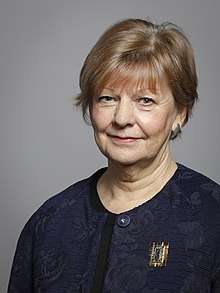Maggie Jones, Baroness Jones of Whitchurch
Margaret Beryl Jones, Baroness Jones of Whitchurch (born 22 May 1955)[1] is a British Labour Peer and previously a trade union official and Labour politician. She was Chair of the Labour Party from 2000 to 2001.

Jones was Director of Policy and Public Affairs of the trade union UNISON until 2006. In 1979 she became a regional official of National Union of Public Employees (NUPE), which merged into UNISON. She has a background as a housing campaigner and environmentalist as well as fighting low pay and discrimination at work. She was previously a trustee of Shelter and WRAP as well as being on the board of Circle Housing Group. She is currently a board member of Ombudsman Services; Chair of Rothamsted Enterprises; Development Board member of ClientEarth and President of Friends of the South Downs.
Early life
Jones was born in Cardiff to Bill and Audrey Jones, and was educated at Whitchurch High School. She then studied at the University of Sussex, gaining a BA in Sociology.[1][2] She now lives in Hove.[3]
Labour Party positions
Jones was a member of the Labour Party's National Executive Committee (NEC) within the trade union section from 1993 to 2005. She was elected Chair of the Labour Party in 2000, the year the Prime Minister Tony Blair controversially appointed Charles Clarke to be the similarly named Party Chairman.[4] She was co-convener, along with Tony Blair, of the NEC Joint Policy Committee for much of her time on the NEC.
Parliamentary candidate for Blaenau Gwent
Jones was the Labour Party parliamentary candidate for the constituency of Blaenau Gwent at the 2005 general election, the safest Labour seat in Wales, and fifth safest in the UK. She was selected from a women-only shortlist which was controversially imposed upon the local party;[5] subsequently eight of twelve members of the local executive resigned in protest.[6] The retiring MP Llew Smith also criticised the selection method.[7]
Peter Law, the Labour Welsh Assembly Member for the constituency, resigned from the party stood against her as an Independent. Prior to the announcement of Law's rumoured candidacy, Jones stated that Law would be "very foolish" to stand against her. She argued "Blaenau Gwent is solidly Labour and I don't think people will vote for anyone else."[8]
Law won the seat with a majority of 9,121 votes, creating one of the media highlights of the election. The Daily Telegraph described Jones' defeat as "one of the most spectacular general election results of modern times".[9]
Peerage and Shadow Minister
Following her election defeat, Jones was nominated for a Life Peerage in 2005 by the Labour Party, according to a list leaked to The Times.[10][11][12] This leaked list eventually led to the Cash for Peerages scandal in which Jones was not implicated. On 10 April 2006, her nomination for a peerage was officially announced,[13] and she was gazetted as Baroness Jones of Whitchurch, of Whitchurch in the County of South Glamorgan on 5 June 2006.[14] Jones' peerage was widely criticised, with Law stating "That is the way New Labour works. It's a poor example of patronage and power." Labour MP Paul Flynn was also critical, he argued: "This is standing democracy on its head. The House of Lords shouldn't be used to reward a candidate who has been emphatically rejected by the electorate."[15]
In June 2010 Jones joined Labour's Shadow Ministerial Team, as Labour's House of Lords spokeswoman on Culture, Olympics, Media and Sport. She was then promoted to the Shadow Education Minister. Since 2015 she has been Labour's Shadow Environment Minister in the Lords.
References
- Dod's Parliamentary Companion - Google Books
- Martin Shipton (17 February 2005). "Controversial candidate strikes back at 'smear'". Western Mail. WalesOnline. Retrieved 20 June 2009.
- Brighton and Hove News » Brighton Labour member accused of spitting at party meeting makes formal complaint
- Roy Hattersley (26 July 2001). "Blair mistook his Clarke for a chair". The Guardian. Retrieved 24 May 2007.
- "Row as candidate elected". BBC News. 11 December 2003. Retrieved 20 June 2009.
- "Resignations over women-only shortlist". BBC News. 12 December 2003. Retrieved 20 June 2009.
- "Victorious Law attacks 'thuggery'". BBC News. 6 May 2005. Retrieved 15 May 2010.
- https://www.walesonline.co.uk/news/wales-news/controversial-candidate-strikes-back-smear-2406481
- Peter Law - Telegraph
- Greg Hurst (8 November 2005). "Sleaze row as election donors get peerages". The Times. Retrieved 20 June 2009.
- Martin Shipton (10 November 2005). "Peerage for woman who lost safest seat". Western Mail. WalesOnline. Retrieved 20 June 2009.
- "Losing candidate may become peer". BBC News. 9 November 2005. Retrieved 20 June 2009.
- "Working Life Peers List". Number10.gov.uk. 10 April 2006. Archived from the original on 14 April 2006. Retrieved 20 June 2009.
- "No. 58005". The London Gazette. 8 June 2006. p. 7857.
- Losing candidate tipped for peerage | South Wales Argus
External links
| Political offices | ||
|---|---|---|
| Preceded by Vernon Hince |
Chair of the Labour Party 2000–2001 |
Succeeded by Margaret Wall |
| Orders of precedence in the United Kingdom | ||
| Preceded by The Baroness Verma |
Gentlemen Baroness Jones of Whitchurch |
Followed by The Baroness Ford |